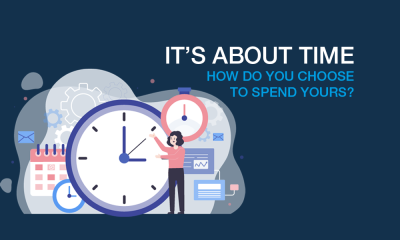It’s About Time
As we approach the end of the year, some of us may have time off coming up or some of us may be busier than usual. Whichever category you fall into, it can be a great time of year to think about how we spend our time and if that matches how we want to spend our time.
We all know logically that time is a finite resource.
Yet many of us live as if it can be stretched so that we can fit more and more into a 24-hour day.
So given time is limited, deciding how we want to spend it is important.
- Do you feel you have choice about how you spend your time? Could you exercise more choice?
- As well as deciding how you spend your time doing things, what do you spend your time thinking about?
“With our thoughts we make the world” said the Buddha.
Here’s three tips for ways to create a framework for deciding how you spend your time:
- Awareness: think realistically about time by knowing that it is a limited resource.
- This includes bringing self-awareness to how we prefer to schedule our time. Do we like to have thinking time first thing in the morning, or later in the day? What do we want to think about? When do we prefer to do our regular tasks? If possible, it’s better to organise the day so it fits with our natural body clock. When are we more awake? When are we more sleepy?
- Arrangement: design and organise plans, schedules and activities to effectively use the time that is available.
- The urgent-important matrix is a way to think about priorities. The horizontal axis goes from urgent on the left to not urgent on the right. The vertical axis runs from important at the top to not important at the bottom. Arrange your activities in this matrix to help decide how to organise your time. For example, anything that is urgent and important is prioritised. Anything that is not urgent and not important is put at the end of the to-do list, or perhaps let go. This applies just as much to what we do outside of work as to what we do during work time.
- Adaptation: monitor the use of time while carrying out activities, including adjusting for interruptions and any changes in your priorities.
- For example, try to reduce errors made in estimating how long something will take; break down long-term challenges into smaller parts that are easier to achieve one at a time; create do-not-disturb time slots for when you need uninterrupted quiet time.
Being more organised in our life can take discipline and effort. Is there any emotional pay-off from not organising yourself well? For example, If you leave things till the last minute, do you get an adrenaline rush when you make it over the finish line just in time? You might have to give this up if you want to be more time-organised.
If you want to discuss how you spend your time, ways to spend your time more effectively, and ways in which you can feel more in control of how you spend your time, give us a call and make a time to talk with one of our skilled counsellors. Contact Newport & Wildman on 1800 650 204.
Stephen Malloch, Manager Clinical Consulting
Cover Image from pikisuperstar on Freepik



